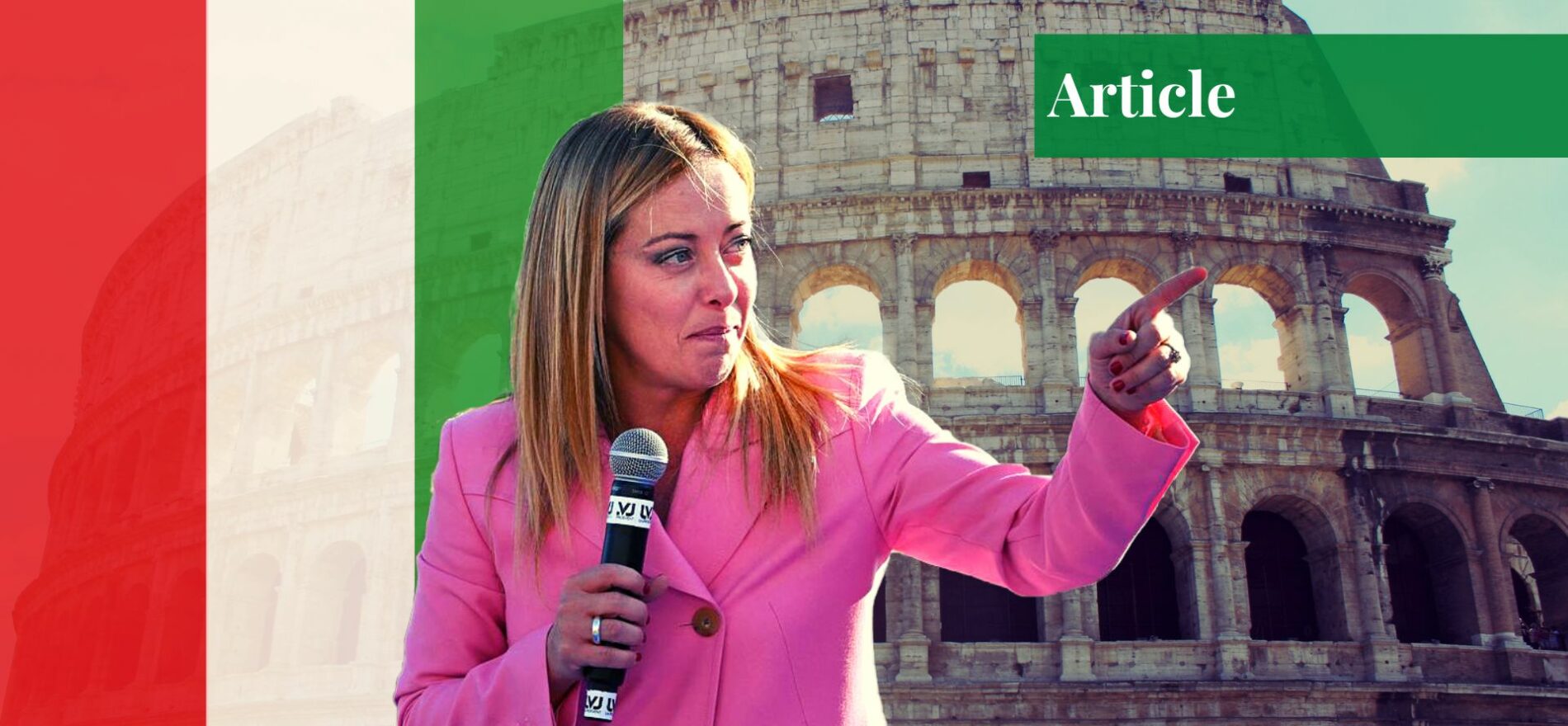Maryam Ibrahim has recently graduated from Lahore College for Women University with a bachelor's in international relations. Her sphere of interest includes the digitalization of international relations, specifically digital diplomacy.
Who is Giorgia Meloni?
Giorgia Meloni will assume office 100 years after Mussolini’s 1922 march on Rome, which acted as a prelude to the rise of Italian fascism. She will be the first far-right woman prime minister in postwar Western Europe. Giorgia Meloni declared victory in the elections and vowed to rule for all Italians. Exit polls indicated that her right-wing coalition had won a sizable majority, putting her on track to establish the most right-wing government since the end of World War II.

As one of the founding six members of the EU, the head of the Brothers of Italy is about to become the nation’s first female prime minister, establishing a precedent for nationalist parties across Europe. However, as Europe faces a winter that will undoubtedly be dominated by high energy costs, the coalition’s anticipated success raises concerns about the nation’s European alliances and its reaction to Russian aggression in Ukraine.
Giorgia Meloni has made an effort to convey consoling words, but the idea of her becoming Italy’s prime minister is not going to be well received in Berlin or Paris. Meloni, a Rome native who started her political career as a young participant in the neofascist Italian Social Movement, disputes the notion that her political views are fascist. She claims that the Italian right long since relegated fascism to the past.
Despite not being a feminist, she highlighted her motherhood and womanhood when campaigning. She has also adopted an aggressive stance on immigration, calling for the Italian Navy to patrol the Mediterranean to prevent migrants from coming in by boat. The election of Meloni may herald restrictions on minority rights, notably those of women and immigrants. The symbol and catchphrase of her Brothers of Italy party, “Dio, Patria, Famiglia,” or “God, country, family,” are reminiscent of their fascist forebears.
Meloni fluctuated between making remarks about her political objectives that were comforting and very contentious during her campaign. She also ambiguously described Benito Mussolini, a former Italian prime minister, as a figure who needed to be understood within a certain historical context. Nearly one hundred years have passed since Mussolini’s march on Rome, which paved the path for his dictatorship.
Italy’s Ever Changing Political System
Italy’s government was once again in disarray in July 2022 when Mario Draghi stepped down as prime minister. The country’s 70th administration since the conclusion of World War II was formed following a hastily called general election that took place in September 2022. This was far more frequent than the country’s declared five-year election cycle, which calls for the formation of one new administration every 13 months on average.

Why does this changing of the guard occur so frequently in the Italian political system, then? There are several political parties in Italy, both at the national and local levels. You could hardly count all the main parties on one hand. Because of this, it is doubtful that a single party will control a majority of seats in Parliament.
Because of this, it is extremely typical for various parties to establish coalitions or alliances both before and after elections. The “Rosatellum system” is a new election regulation that Italy established in 2017 to encourage minor parties to form coalitions. A so-called mixed electoral system, which combines the use of majority and proportional representation, upholds direct universal suffrage.
Spain, Belgium, Denmark, and the majority of European nations adopt proportional representation. Therefore, the hybrid electoral system in Italy promotes political parties to join coalitions earlier—before elections. While necessary to establish a government, this may also be a cause of instability. This is thus because various political groups frequently have contrasting views on how to rule or distinct political goals.
For instance, Mario Draghi was able to bring together a wide range of parties in his national unity administration, which helped him win the position of Italy’s prime minister in 2021. But the vast alliance finally fell apart due to the parties’ extreme ideological diversity. In a vote of confidence, Draghi’s partners ignored him. Even though he ultimately won the confidence vote, he soon submitted his resignation.
Additionally, party allegiance is a far less common idea in Italy than it is in nations like the US. Even the party leaders themselves are prone to switching sides. The populist party Together for the Future was founded in 2022 by Luigi Di Maio, the former head of the Five Star Movement. Over the last several decades, there have been numerous attempts to alter the election system and the constitution of Italy, but this hasn’t stopped the nation from seeing frequent changes in government.
How Do Italian Elections Work?
After a 2020 constitutional referendum, the Italian elections will operate a little differently this time. In reality, since the end of World War II, the voting system has altered four times, most recently for the 2018 election. Currently, 37 percent of members in both chambers are chosen by majority vote (first-past-the-post), which accounts for 37 percent of the seats, and two percent are chosen by Italians who reside abroad.
Two votes are cast by Italians, one for each chamber of Parliament. This time, the number of senators will decrease from 315 to 200, while the number of deputies will decrease from 630 to 400. The head of state begins consultations to choose the next prime minister and their council when the allocation of all lower and upper house seats using the aforementioned procedure is complete.
The political leader, who has the backing of the victorious parties and is considered to be able to earn the confidence of the Parliament, is finally given the position of Italy’s prime minister by the head of state. The names of the remaining ministers follow quickly. Both domestic and foreign citizens find the system to be perplexing, and Pope Francis said last week that he did not fully comprehend it when asked for his opinion.
Effect of Giorgia Meloni’s Victory on Italy
From a statistical standpoint, the ascent of the Brothers of Italy is identical to that of all other Italian anti-system groups starting in the 1990s. Although the size of the Italian pattern is distinct, protest parties have been widespread in most of Europe for the past 20 to 30 years, and not all of them have been overnight successes.
Brothers of Italy, a group that was founded in 2012, capitalized on the increasing populist unrest brought on by the eurozone’s debt crisis, which it attributed to “European bureaucrats” and the banking sector. Critics claim that while the tone has changed to be more somber, the content has not changed.
However, it is difficult to restrict democratic rights in a highly decentralized economy and a modern society. Delivering economic development would not be possible if Italy is pushed into a fully-fledged authoritarian government. The fact that European institutions keep Italy’s economy afloat is one factor.
Giorgia Meloni, undoubtedly, considered leaving Europe at some point in the past. A proposal that would enable the European Commission to be pushed into an agreed-upon and controlled breakup of the eurozone was the goal of Meloni’s 2014 campaign promise to “create a majority in the European Parliament with the other Euro-critical groups.” The “managed disintegration” of the monetary union or Italy’s exit from the euro was proposed in the Parliament by the Brothers of Italy.
Meloni might perhaps go against the grain of Europe by siding with Poland and Hungary on international affairs. This anti-European front is theoretically conceivable and may serve as the foundation for a nationalist thesis. The three nations wouldn’t be able to completely block the others, therefore the outcomes in practice would be dismal. The Italian government will have to make difficult decisions.
It is highly probable that, once in power, Giorgia Meloni would adopt a more traditional political stance toward Europe unless there is a ferociously pro-fascist campaign on social media after the elections – a feature that political analysis frequently tries to account for. She may be more subdued in her insistence that Italian sovereignty takes precedence over European loyalty.
If you want to submit your articles and/or research papers, please check the Submissions page.
The views and opinions expressed in this article/paper are the author’s own and do not necessarily reflect the editorial position of Paradigm Shift.


















